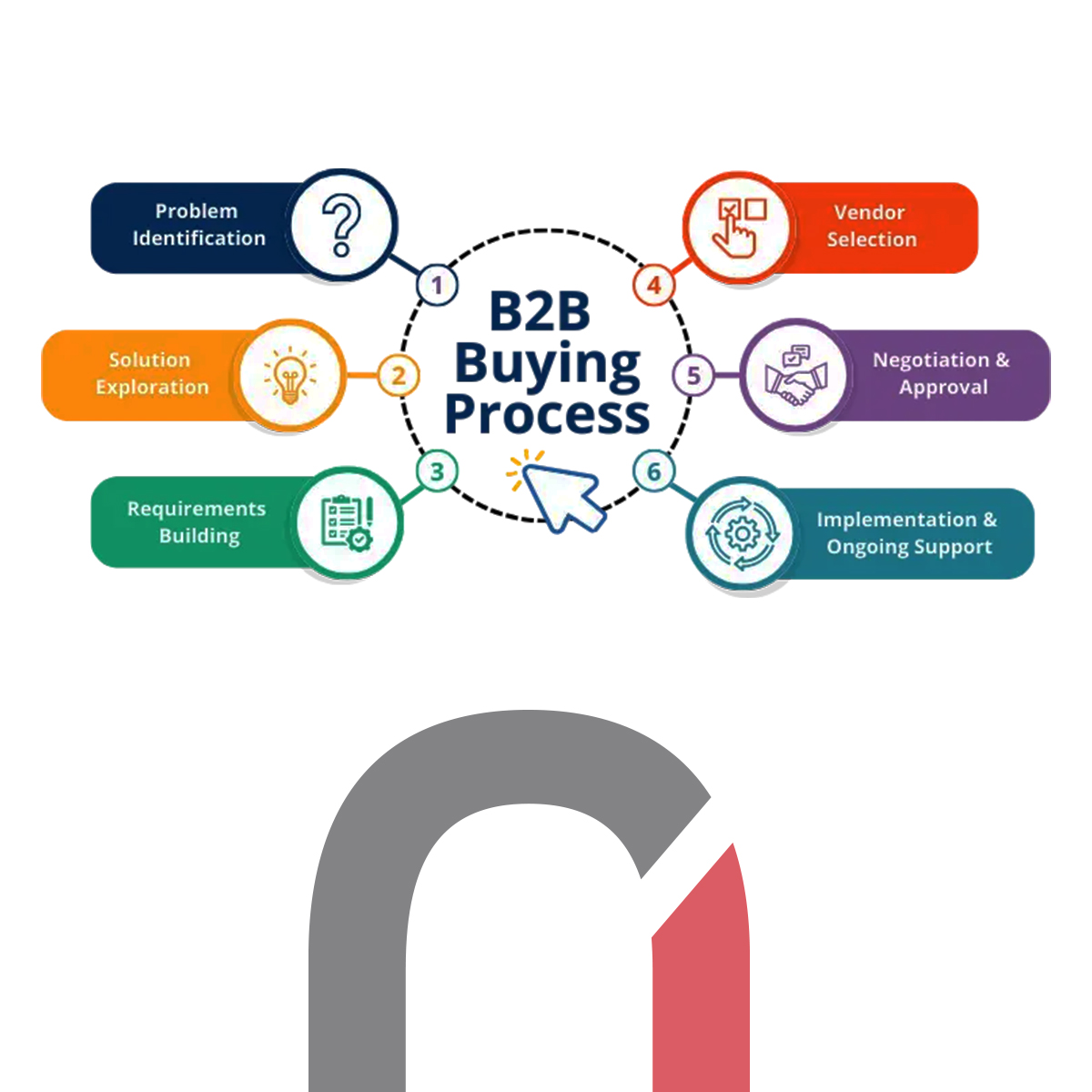The business world is constantly evolving, especially when it comes to the B2B marketplace. It is very important for organizations to make sure they have an understanding of the buying process. Contrary to the purchase by B2C consumers, the B2B purchase process is longer, more rigid, and involves different decision-makers, with a great emphasis on value-providing and return on investment. Various factors can affect the B2B buying process; In this blog, we will look at the top factors of the B2B buying process and how businesses can deal with them. Read the article below to discover information that can revolutionize your B2B selling strategy!
What is the B2B Buying Process?
The B2B buying process involves multiple stages that an organization follows to make a purchase of products or services from another business. Unlike B2C purchases, B2B buying is more complex, with various decision-makers and steps involved. It typically begins with identifying a business need, often a solution to a problem, followed by thorough research and evaluation to make an informed decision.
Here, the company investigates, collects information, and sometimes consults within the organization with other stakeholders like procurement, finance, or department heads. After this, they get into the selection stage and compare the various suppliers, considering factors such as price, quality, reliability, and reputation of the supplier, among others.
Further, after selecting a solution, most organizations engage in discussions on factors such as costs, the time required to deliver the solution, and other support services. Once all terms are agreed upon, the purchase is made, marking the beginning of the business partnership. Even after the transaction, ongoing analysis is conducted to ensure the purchase meets the company’s needs. Understanding the nuances of this process helps marketing and sales managers better identify their potential client’s requirements and tailor their strategies to support informed decision-making.
Factors That Influence the B2B Buying Process
When it comes to the B2B buying process, several factors weigh heavily on the decision-making journey. The most critical aspects that influence this process are as follows:
Performance
For B2B buyers, the performance of a product or service is often the first and foremost consideration. Businesses are looking for solutions that not only meet their immediate needs but also offer long-term reliability and efficiency. Unlike B2C purchases, where emotional or brand-driven factors can influence decisions, B2B buyers prioritize results and functionality. They need to ensure that the product or service will integrate seamlessly into their operations and contribute to improved outcomes, whether that’s boosting productivity, enhancing service quality, or driving cost savings.
Performance evaluations are typically based on technical specifications and past experiences with the vendor. B2B buyers often seek out reviews, case studies, and testimonials from other businesses to gauge whether the solution delivers as promised. For significant investments, product demos or trials are requested to assess real-world performance. Products or services that consistently deliver strong results are more likely to stand out and succeed in a competitive market.
Here are a few key performance considerations for B2B buyers
- Scalability ensures that the product or service can expand as the business grows, making it a key factor for sustained business growth.
- Durability and dependability are enhanced by strong support systems and easy maintenance, ensuring long-term usability.
- Configuration capabilities that can help a business meet its specific requirements concerning organizational processes.
- Compatibility with existing systems enables seamless integration, maximizing synergy and operational performance.
- Long-term considerations, such as environmentally friendly solutions, are increasingly valued for achieving sustainable, lasting performance.
Pricing
B2B Pricing is a deciding factor crucial in the B2B buying process. e buyers may be willing to invest in high-quality products, they carefully evaluate costs based on the expected return on investment (ROI). The price must align with the value provided by the product or service and should be competitive within the market. Balancing quality, ROI, and market trends is essential for a successful purchase decision in the B2B space.
Unlike B2C markets, where pricing is a one-time charge, a B2B setting is far more complicated. Some of the features that interest the buyers include subscription plans, monthly obligations, and the total lifecycle cost. They also consider matters related to payment, such as whether the vendor has a sponsorship package or discounts for long-term agreements. Also, a company might decide to purchase depending on how the product can help save costs in the future by cutting employment time, increasing productivity, or sparing time needed for repair or sorting through problems.
Here are a few Pricing Dynamics in B2B Buying Decisions
- You can create a transparent pricing policy, which creates trust with the buyers and allows for evaluation of the actual worth of the offering.
- Options like delayed payment or creating a system of payments whereby some payments can be deferred until later can also influence decision-making.
- Many customers consider additional services, like implementation costs or training fees, when evaluating and comparing prices.
- Volume-based pricing models, also known as bulk discounts, can become interesting for a business that needs to place a large order, offering significant savings.
- Fixed annual costs are safer for financial planning as they give an assured rate over a long period.
Customer Service
Customer care service is another element that affects the B2B purchasing process. In the B2B world, the connection between buyers and sellers is not only restricted to one-time sales but can be more protracted. Companies want vendors that are going to be there for the long haul, help them get problems addressed on priority, and keep them updated regularly. The customer service provider speaks for itself and may be the only thing that can sway a deal from progressing to the second stage/level.
In recent years, well-orchestrated value propositions, customer-specific account managers, a dedicated and accessible support team, and a personable approach have become essential for B2B buyers. They seek comfort in knowing if any issues occur after they have made their purchase; the supplier is always ready to provide solutions, fix the product, or replace it. Adequate customer relations services help to keep businesses’ interferences to a minimum. Lack of good customer relations at the same time erodes confidence, strains relations, and could cost loss of long-term contracts.
Businesses often evaluate a vendor’s customer service based on reviews, industry reputation, and even personal interactions during the sales process. Vendors who provide good customer support are more likely to retain clients, which strengthens their position in the market.
Here are five unique impacts of customer care service in the B2B purchasing process:
- Customer support includes more than just resolving issues, it is going the extra mile in order to offer service before a customer actually seeks it out.
- An efficient process of onboarding new clients displays how much a vendor is willing to serve them in the long run.
- Multi-channel support including live chat, email, or phone, means that customers receive support in their preferred way.
- The help of customer service teams in providing the necessary training and materials can improve operational efficiency.
- Follow-up meetings and performance reports from customer service ensure proper synchronization with the client, fostering strong relationships.
Experience and Expertise
Experience and expertise are other factors affecting the B2B buying decision, especially when choosing a vendor. Customers expect their suppliers to bring value, and relationships are based on the supplier’s expertise in the buyer’s industry. This expertise provides buyers confidence in the ability of the vendor to appreciate their needs and provide appropriate solutions that will yield desirable outcomes.
When a vendor has great experience or exposure to the industry, it is much more likely to appreciate the dynamics of the client business than anticipated and offer solutions beyond the actual product or service.
As is the case with any business purchasing decision, B2B buyers are more likely to select a vendor that is perceived as a market leader or knowledge expert in their particular industry. The competency of a vendor can be compared to success stories, accreditations, and successful business relations that he has had with organizations in the same line of business. Lastly, the benefits include creating confidence among the buyers when deciding to partner with a specific vendor and creating stable and strong business relationships since the vendor has lots of experience and knowledge.
Below are five key roles that Experience and Expertise play in B2B Buying Decisions
- Vendors that have certifications or qualifications in the specific industry are more trustworthy than others.
- Buyers appreciate vendors who have knowledge about the industry sector and can predict future trends and innovations.
- Sharing experiences and ideas from various industries benefits vendors by helping them find solutions beyond the common practices of a single industry.
- Buyers with global experience in managing exalted projects or extensive rollouts benefit a vendor selling into an enterprise organization with complex requirements.
- The vendor’s capability to offer consultation based on experience makes the buyer more effective in making the right decisions that will shape the future.
Customization and Personalization
B2B products are no longer one-size-fits-all, and the ability to provide unique or tailored products as per the needs of the customer is a crucial element of the buying process. Most business purchases are not standard ‘off the shelf’ products as is with consumer products; hence, businesses need flexibility to customize what they buy. Whether it refers to software that can be integrated with existing processes or a service offering that is tailored to a specific set of operations, businesses want the freedom to adapt what they are purchasing. This ability to tailor a product or service can greatly influence the purchase decision.
Personalization implies a comprehensible analysis of the buyer’s industry by the vendors and their conditions. It proves that the vendor is not only not just selling a product, but offering a tailored solution that aligns with the buyer’s operations. Moreover, customization tends to enhance the perceived value of the buyer because it is built specifically based on what the buyer wants to achieve and the problems he is facing.
Here are five key roles of customization that influence the B2B buying process:
- Vendors offering modular solutions allow buyers to pick and choose features that best suit their needs, increasing flexibility.
- Tailored onboarding and training for customized products help ensure seamless adoption and long-term success for the buyer.
- Customization often involves ongoing collaboration between buyer and vendor, fostering a deeper partnership and trust.
- Vendors who offer scalable custom solutions provide businesses the ability to adapt as their needs evolve, ensuring long-term value.
- Offering bespoke reporting or analytics, tailored to a buyer’s specific KPIs, enhances the perceived value of the product or service.
Reputation and Trust
In B2B transactions, reputation and trust are critical to the buying process. B2B purchases tend to involve higher stakes—such as long-term contracts, significant financial investments, and critical business operations—buyers need to trust that the vendor they choose is reliable, ethical, and capable of delivering on their promises.
A vendor’s reputation is often built over time through consistent performance, positive customer relationships, and a proven track record in the industry. B2B buyers frequently conduct extensive research on potential vendors, seeking out reviews, client testimonials, industry awards, and even speaking with other businesses that have worked with the supplier. A strong reputation can mitigate concerns and shorten the decision-making process, as buyers feel more confident partnering with a well-established, trusted vendor.
Trust also comes into play during the negotiation and post-purchase phases. Buyers need to trust that the vendor will honor their commitments, meet deadlines, and provide the level of service agreed upon. Any misstep, such as a delay in delivery or a failure to meet agreed specifications, can quickly erode trust and damage the business relationship. Therefore, vendors who prioritize transparency, reliability, and integrity are much more likely to win—and retain—B2B clients.
Here are five unique roles of reputation and trust in B2B transactions:
- Vendors with a proven track record of ethical business practices and transparency are more likely to secure long-term contracts in competitive markets.
- Buyers often value vendors with established relationships in their industry, as peer endorsements can further solidify trust.
- Corporate social responsibility (CSR) initiatives can positively influence a vendor’s reputation, reflecting a commitment to ethical practices beyond just business.
- Consistent communication throughout the sales cycle helps build trust by keeping buyers informed and aligned with project timelines.
- Vendors who proactively address potential issues before they escalate demonstrate accountability, strengthening trust with B2B clients.
Conclusion
In conclusion, the B2B buying process is shaped by a range of several factors that influence how businesses make purchasing decisions. By understanding and addressing these factors, businesses can better position themselves to meet the needs of B2B buyers, ultimately creating stronger partnerships and driving growth.
To successfully navigate the complexities of B2B sales, it’s essential for vendors to offer more than just a product—they must deliver value, reliability, and an exceptional customer experience to stand out and be successful.



